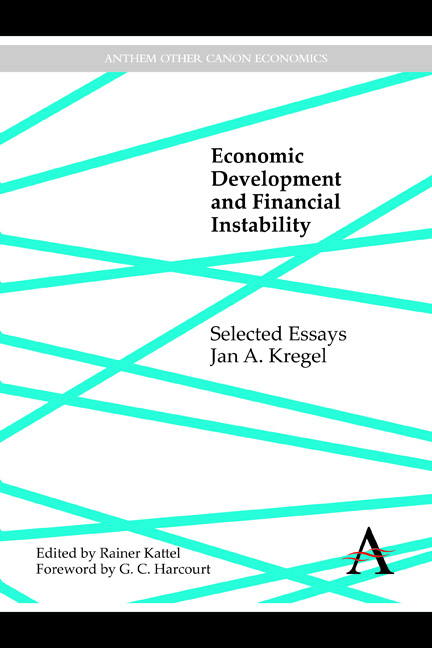Book contents
- Frontmatter
- Contents
- Foreword
- Publication History
- I Theoretical Discussions
- 1 Financial Markets and Economic Development: Myths and Institutional Reality
- 2 External Financing for Development and International Financial Instability
- 3 Capital Flows: Globalization of Production and Financing Development
- 4 Some Risks and Implications of Financial Globalization for National Policy Autonomy
- 5 Two Views on the Obstacles to Development
- 6 Can We Create a Stable International Financial Environment that Ensures Net Resource Transfers to Developing Countries?
- 7 Natural Instability of Financial Markets
- 8 Trying to Serve Two Masters: The Dilemma of Financial Regulation
- II Finance for Development
- III The Crisis in the US and the EU
- Index
6 - Can We Create a Stable International Financial Environment that Ensures Net Resource Transfers to Developing Countries?
from I - Theoretical Discussions
Published online by Cambridge University Press: 05 November 2014
- Frontmatter
- Contents
- Foreword
- Publication History
- I Theoretical Discussions
- 1 Financial Markets and Economic Development: Myths and Institutional Reality
- 2 External Financing for Development and International Financial Instability
- 3 Capital Flows: Globalization of Production and Financing Development
- 4 Some Risks and Implications of Financial Globalization for National Policy Autonomy
- 5 Two Views on the Obstacles to Development
- 6 Can We Create a Stable International Financial Environment that Ensures Net Resource Transfers to Developing Countries?
- 7 Natural Instability of Financial Markets
- 8 Trying to Serve Two Masters: The Dilemma of Financial Regulation
- II Finance for Development
- III The Crisis in the US and the EU
- Index
Summary
Minsky's Analysis of Financial Fragility
Minsky's work was initially concerned with the relationship between business firms and the banks that lend to them. However, the different types of repayment profiles that Minsky sets out to classify the potential fragility of the system have general application. In particular, they can be applied to countries that borrow in international financial markets to supplement the resources necessary for their development. It is generally argued that developing countries have higher prospective rates of return on investment than more advanced industrial countries, and that their lower incomes are also accompanied by lower savings ratios than in developed countries. As a result, there should be a steady flow of lending to developing countries to allow developed country savers to exploit the higher returns; this should also allow developing countries to exploit their higher growth potential. Thus developing countries will be in the same position as a firm attempting to raise additional financing.
Minsky's framework of repayment profiles starts from the balance sheet of the borrower, noting that the income-generating capital on the asset side of the balance sheet has been financed by the issue of liabilities carrying cash payment commitments on the liability side. The repayment profile matches the interest, dividend, and amortization payment commitments generated by the liabilities against the earnings flows generated by the capital assets.
- Type
- Chapter
- Information
- Economic Development and Financial InstabilitySelected Essays, pp. 85 - 98Publisher: Anthem PressPrint publication year: 2014

